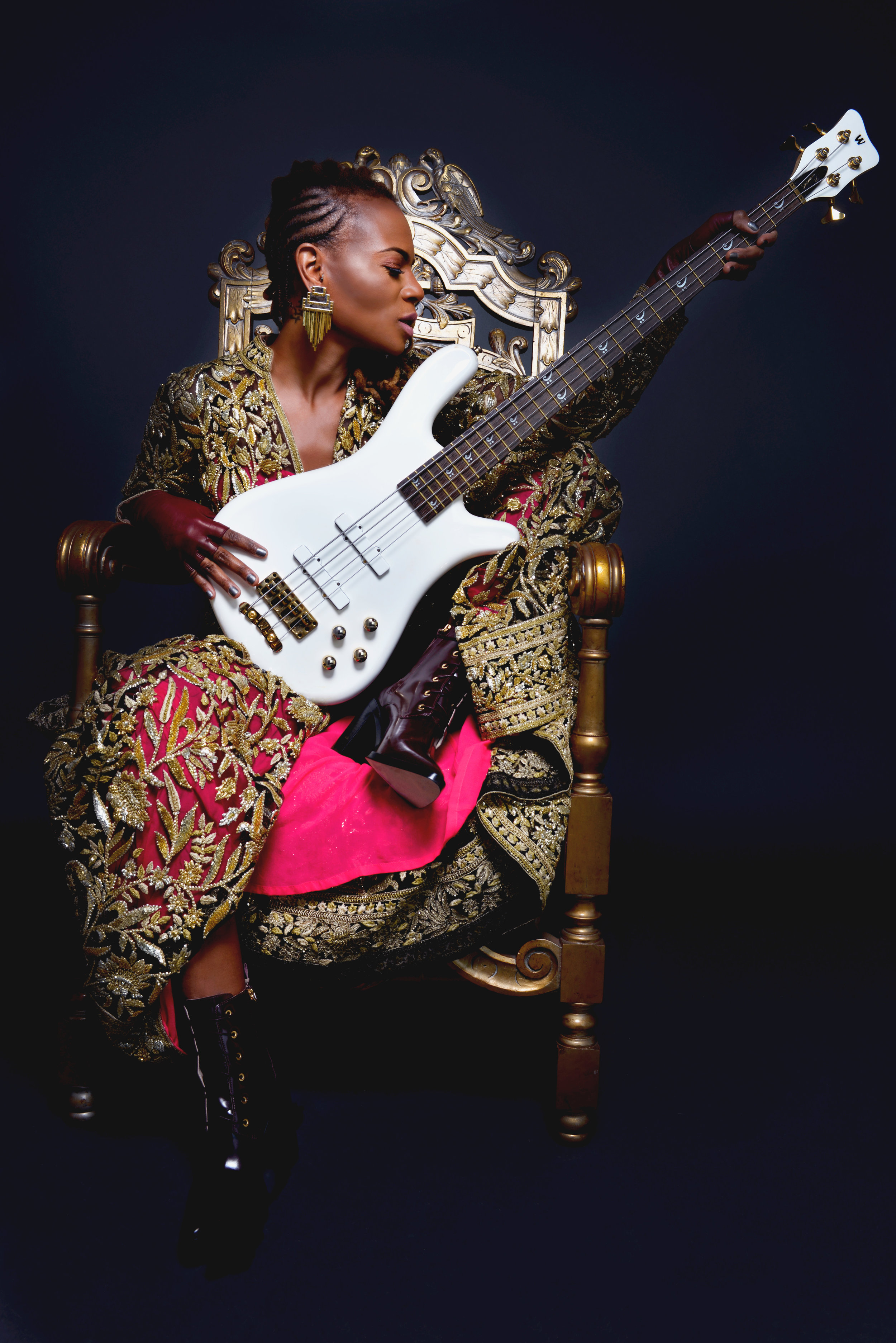Interview With Legendary Bassist Divinity Roxx
by Chinwe Oniah
Many of the backing musicians behind some of the greatest musical acts in history are men. The Spiders From Mars (David Bowie), The Wailers (Bob Marley), The E Street Band (Bruce Springsteen) are all bands that have received significant recognition for their talent. However, you'd be surprised at how many badass women out there do it just as well as the guys.
Sly and the Family Stone and and Sun Ra’s Arkestra both included women in their backing bands. Prince was also well-known for having women in his bands. Keyboardist Lisa Coleman and guitarists Wendy Melvoin and Donna Grantis were integral parts of Prince’s backing band, The Revolution and 3rdeyegirl. Prince was constantly affirming the unmatched talents of his female backup musicians, once saying that Donna Grantis could “whup every man on guitar, bar none.”
Beyoncé felt the same way when she formed her all-woman backing band, The Suga Mamas. Since 2006, The Suga Mamas have been rocking with Queen Bee from world tours to the Superbowl. The band has even garnered their own popularity among Beyoncé fans.
We recently caught up with bassist Divinity Roxx, a former member of The Suga Mamas. She’s a musical force as a rapper/singer, producer, songwriter, musical director, and even has her own publishing company, Hot Tottie Music Publishing. She champions women to uplift other women and isn’t intimidated by men who try to undermine her. With years in the music industry, Roxx learned how to navigate the biz while staying true to herself.
WIM: How did you begin your career as a musician?
Divinity: I started a hip-hop group in high school called DATBU, (Divinity and the BreakFast Unit). We released our own music and pretty much managed and promoted ourselves once we realized labels weren't interested in taking on "unsolicited acts". I guess that experience stayed with me as I pursued my solo career after picking up the bass in college.
WIM: Who are your inspirations?
Divinity: My biggest inspirations are female authors and poets like Alice Walker, Toni Morrison, and June Jordan. I always wanted to take what I gained from books and be able to give that to people in the form of music.
I've always aspired to inspire others, particularly women and young girls through music and art because I've been so inspired through music and art to experience the world from a unique perspective and be uplifted in that. If you're inspired to dance and have a good time, think deeply about something or have your own realizations while listening to my music then I'm doing what I set out to do.
WIM: It’s not every day that we hear about women instrumentalists. What do you think women bass players bring to the table?
Divinity: Actually I think there are tons of women instrumentalists so I don't live in a world where we don't hear about them. But I suppose they aren't as prevalent as others. I think women bass players bring to the table the same thing that any other bass player brings to the table; they play bass. They want to be great at it and they want to be able to work and support themselves doing it. Women bring a unique perspective and approach to anything they do. There are so many great players out there.
WIM: You were in a supporting band for one of the most domineering acts in music today. What have you learned from working with Beyoncé?
Divinity: I learned so much from all the other women in the band. I learned how to be an effective leader from Kim Burse who was the creative director and head music director. I learned what it takes to function at the level that you see an artist such as Beyoncé navigate. One of the most valuable lessons I learned from Beyoncé is that we have the power to control our own stories and write our own narratives.
WIM: What are challenges you’ve found that women musicians face in the music industry?
Divinity: More than anything female musicians face the challenge of being invisible and not being given the same consideration and opportunities as our male counterparts. Did you hear what [Grammys president] Neil Portnow said [about] women needing to step it up? What a load of shit! No matter how good we women are, we are often overlooked, talked over, ignored and undervalued.
Oftentimes, as musicians, our sexuality [is] a selling point rather than that being just the icing on the cake. Sure, it’s nice to see a nice looking woman playing an instrument, but until that becomes secondary and [our talent] becomes first and foremost, we will continue to deal with the subjugation of our gender.
WIM: Women musicians frequently find themselves to be the only woman in a musical group. How do you hold your own amongst bands and groups that are predominantly men?
Divinity: First off, I show up as a professional musician, not a "female" musician.
Oftentimes, I'm in a leadership position when I walk into the room so that carries some weight. I've been doing this for a while and I've worked hard to "earn my stripes" so when I walk in the room people tend to respect those stripes. I'm such a student of music and of life so I'm also usually prepared when I'm in any band. I've studied the music and [I] am ready to go (which is really important).
I'm not afraid to call somebody out if I feel like they're "vibing" me. I've fired male musicians from my band for constantly challenging not only my ability to make effective and definitive decisions in a band setting, but also the decisions I make. I've also worked in harmony with way more men who are collaborative and respectful. So, I'm fortunate in that.
WIM: What advice do you have for women who want to work in this industry as a musician?
Divinity: Be professional. Do the work. Find a network and work it. Get out there and hustle and put yourself in a position where you can do what you want to do. Go out and play. Sit in. Fall on your face. Get up and get back out there. Keep going. All the same things I would say to anybody who wanted to be successful in any endeavor, male or female. Get out there and do the work and know it won't come easy, but fight for what you want and what you believe. I can't stress enough the importance of being a professional. That commands respect out the gate.
*Interview has been edited for clarity.


